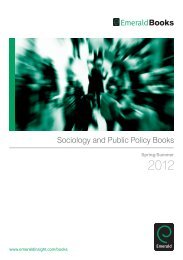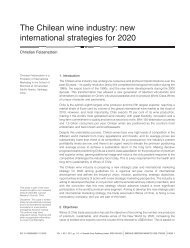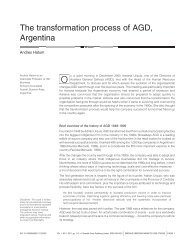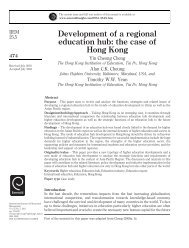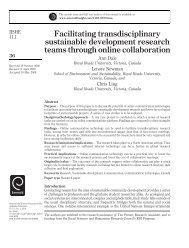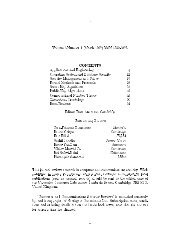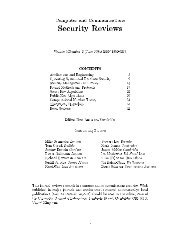CONTENTS - Emerald
CONTENTS - Emerald
CONTENTS - Emerald
Create successful ePaper yourself
Turn your PDF publications into a flip-book with our unique Google optimized e-Paper software.
8 Theoretical Cryptology<br />
041801 `Homomorphic threshold schemes, k-arcs and Lenstra's constant'<br />
S Barwick, Y Desmedt, P Wild, Cirencester 93 pp 95{102<br />
Homomorphic threshold schemes have the property that if shares ai can be used<br />
to reconstruct the secret A and bi to reconstruct B, then ai bi can reconstruct A B.<br />
previous schemes, de ned over an arbitrary nite Abelian group, had the restriction<br />
that the number of shares was limited by the smallest prime factor of the group order.<br />
The authors show that this restriction can be overcome by considering the group as a<br />
module over some suitable extension of the integers.<br />
041802 `Graph Decompositions and Secret Sharing Schemes'<br />
C Blundo, A De Santis, DR Stinson, U Vaccaro, Journal of Cryptology v 8 no 1 (1995)<br />
pp 39{64<br />
The authors survey the information rate of the graph of a secret sharing scheme.<br />
They look at upper bounds based on entropy arguments, and lower bounds from graph<br />
decompositions; the latter case involves linear programming. Some general results are<br />
proved on the information rate of paths, cycles and trees, and speci c results are given<br />
for the 30 connected graphs on ve vertices or less.<br />
041803 `A Perfect Threshold Secret Sharing Scheme to Identify Cheaters'<br />
M Carpentieri, Designs, Codes and Cryptography v 5 no 3 (May 95) pp 183{187<br />
The author discusses the evolution os secret sharing schemes which detect attempts<br />
to cheat, and presents a perfect and unconditionally secure (k; n) threshold scheme each<br />
of whose participants' secret amounts to k +2(n,1) elements of a nite eld rather<br />
than the previous n +2k,3.<br />
041804 `Disenrollment capability of conditionally secure sharing schemes'<br />
C Charnes, J Pieprzyk, ISITA 94 pp 225{227<br />
The paper gives the construction of a secret sharing scheme, using a modi cation<br />
of Shamir's scheme, whose security relies on the di culty of the discrete logarithm<br />
problem. Shareholders use their 'initial conditions' to recalculate new shares if the<br />
exiting ones are invalidated.<br />
041805 `Zero-Knowledge Proofs of Computational Power in the Shared<br />
String Model'<br />
ADeSantis, T Okamoto, G Persiano, Asiacrypt 94 pp 160{170<br />
The authors formalise the concept of non-interactive zero knowledge proofs of computational<br />
power, and give some implementations for certain types of dense random<br />
self-reducible and uniformly generatable problems.<br />
041806 `Multiplicative non-abelian sharing schemes and their application<br />
to threshold cryptography'<br />
Y Desmedt, G de Crescenzo, M Burmester, Asiacrypt 94 pp 2{13<br />
The authors show multiplicative secret sharing schemes which can be used with<br />
threshold signatures which are based on non-Abelian groups to produce perfect zeroknowledge<br />
threshold proofs of knowledge.<br />
041807 `Comment -multistage secret sharing based on one-way function'<br />
L Harn, Electronics Letters v 31 no 4 (16/2/95) p 262<br />
The author shows a slight improvement inascheme of He and Dawson (below).<br />
041808 `Multisecret sharing scheme based on one-way functions'<br />
J He, E Dawson, Electronics Letters v 31 no 2 (19/1/95) pp 93{95<br />
Multistage secret sharing schemes can be used to reconstruct a number of secrets<br />
in order given just one share per participant. The authors show how to generalise this<br />
so that secrets can be reconstructed in any order.<br />
45



